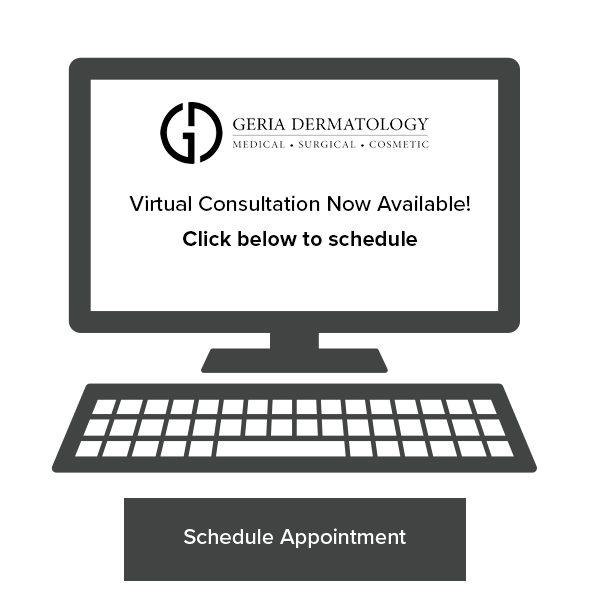Psoriasis Treatment New Jersey
Conveniently Located to Serve Rutherford, Verona, Bergen and Essex Counties
Psoriasis is a chronic inflammatory disease of the skin that makes skin cells grow faster than usual, causing them to pile up. While the condition takes many forms, about four in five patients have plaque psoriasis, the type that causes red, raised patches of skin covered with silvery-white scales. If you’re living with psoriasis in New Jersey, you can find relief at Geria Dermatology.
There, a board-certified dermatologist provides advanced management strategies for patients with psoriasis. He has treated patients with psoriasis for several years and has developed an expertise in addressing the condition. To learn more, call or book your appointment online today.

Frequently Asked Questions
Researchers believe that both genetic and environmental factors play a role in the development of psoriasis, which isn't contagious. Factors that are known to trigger the condition or make it worse include:
- Skin injuries, including cuts or sunburns
- Specific infections, including strep throat
- Prolonged vitamin D deficiency
- Chronic psychological stress
- Specific medications, including beta blockers
- Smoking or heavy alcohol consumption
Psoriasis is the result of an error in your immune system that causes your skin cells to grow too fast, sometimes even ten times as fast as normal. Rather than forming over the course of a week, like normal, these new skin cells form in just days.
When excess cells build up on the surface of your skin, they form patches. As they continue to pile up, these patches become thicker and scalier. Psoriasis patches are often itchy and sore; they can also become very dry, form cracks, and bleed. These patches may be small or very large. Stiff or swollen joints or thickened fingernails or toenails may also be indicators of certain types of psoriasis.
Psoriasis typically appears for several weeks or months, increasing in severity, and then decreases or disappears temporarily.
Psoriasis can affect many regions of the body. Typically, it appears on the face, scalp, elbows, knees, palms, knees, lower back, legs, and the soles of the feet.
Psoriasis increases a patient’s likelihood of developing a number of health issues. These include psoriatic arthritis, cardiovascular disease, eye conditions, autoimmune conditions, Type 2 diabetes, obesity, and high blood pressure.
Although psoriasis takes many forms, most patients are affected by one of the following:
Plaque psoriasis
Plaque psoriasis, the most commonly diagnosed type, causes patches of dry skin that are raised, red, and overlaid with white or silvery scales. These lesions may be few or many and can appear anywhere.Guttate psoriasis
This type of psoriasis is often brought on by a bacterial infection, and mostly affects children and adolescents. It causes small scaling lesions on the arms, legs, trunk, or scalp.Psoriatic arthritis
This form of psoriasis is unique in that it causes swollen, painful joints as well as inflamed, scaly patches of skin. Symptoms may be mild or severe and can affect any joint.Inverse psoriasis
Usually triggered by a fungal infection, inverse psoriasis causes patches of smooth, red, skin in the armpits, groin area, or under the breasts. The inflammation gets worse with sweating or rubbing.Other types of psoriasis include erythrodermic psoriasis, pustular psoriasis, and nail psoriasis.
Psoriasis is incurable, so the primary goal of treatment is to successfully manage the condition by reducing inflammation and clearing your skin.
For mild to moderate cases, applying topical creams and lotions directly to lesions can provide excellent results.
These creams and lotions are formulations of retinoids to slow cellular growth, coal tar to treat a number of symptoms, or corticosteroids. For scalp psoriasis, salicylic acid shampoo may be prescribed.
XTRAC laser is a state-of-the-art psoriasis treatment that involves controlled exposure to ultraviolet light to help slow cell turnover and reduce scaling and inflammation. Because light therapy doesn’t target healthy tissues, it can safely deliver a high-dose treatment for faster clearing and longer remission.
During a consultation at our office, we will perform an examination of the affected areas. These may include your scalp, skin, fingernails, and toenails. You will also be asked about your family history with psoriasis.
In some cases, it may be necessary to perform a biopsy of the affected skin tissue in order to determine which type of psoriasis is occurring. This will aid in deciding on the appropriate treatment option.
Treatment is decided based on factors such as your overall health condition, the size of the rashes, your age, and the locations of the rashes on your body.
The price of psoriasis treatment varies depending on the chosen treatment method. Cost can be discussed during your consultation.
I “suffered” from psoriasis and psoriatic arthritis and most dermatologist i went to said oh so sorry its an auto immune issue try some steroids. There lack of empathy was appalling to me. When i met Dr geria it was a completely different experience he really listened and came up with a plan. I had insurance issues he filed numerous appeals, hours worth of work he did not have to do. Notice how i said suffered in past tense i am now completely clear and pain free!!!!
Read More Testimonials
Contact Our Office
Patients who are looking for management options for psoriasis in New Jersey should contact us immediately to set up a consultation. We will be happy to discuss your treatment options with you, review before and after photos, and recommend an effective course of action.




